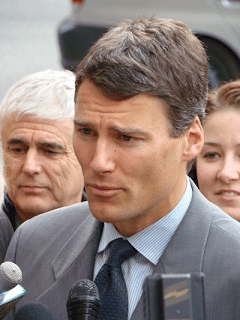Beyond P!nk 2010 was my first weekend-long conference. Myself and about 200-250 other young women (average age: 22) attended what I found to be the most educational/inspiring weekend I've had in the last 3.5 years of my post-secondary career.
Run by the incredible efforts of Young Women in Business (YWiB), the organizers creatively put together a series of keynote speakers, workshops and mentor discussions that were unforgettable. All of the keynote speakers were incredible women who have done incredible things that no ordinary woman could accomplish. And I don’t want to sound harsh, here, you would have to hear the stories yourself to understand just what I mean.
The theme of BP2010 was “Make your brand…leave your mark.” On the surface, this phrase sounds like just another superficial, corporatized catch phrase. Yet the word “brand” was used metaphorically—for one’s brand really represented one’s personality; requiring all of us to consider our selves. In order to make our brand, then, we learned the basic ways to start living who we are.
Who I am is what I stand for, it is how I live my life, and it is who I spend time with. It is about deciding what my “non-negotiables" are: what I will not tolerate in any kind of relationship. It is about making rules that I live by that serve me, and changing them only when they do not serve me any longer.
It is about what I do—how I behave, how I achieve my goals, and how I decide when to change my life if it is not the life that I want. The speakers all had very different careers, but all of them went through similar phases. They all had their ideal “dream job” early in life, and later discovered that what they thought would be their dream job was really their living nightmare. Unhappiness came from even the most glamorous of jobs: ones with enormous salaries, impressive titles and in prestigious corporations. Each also went through a personal crisis that led to a clarifying moment in self-reflection.
It was not until each of them decided what was important to them personally that they could achieve their successes professionally. And not one got to where they are today without 100% determination requiring years of 40-60 hour work weeks, countless failures and mistakes, and endless effort. The difference that really struck me was that these women were striving to do work they loved—they all have jobs they are truly passionate about.
Usually, we think that if we get a raise or a promotion at our job we can either have more money to do the things we want to do, or more time to do them. But this isn’t what success is about. Every woman I met openly admitted that the “balance” between “work” and “life” is completely mythological. They spend most of their lives working, and talking about work, and thinking about work. The truth is that most of us will too, whether we want to or not. So we should want to.
We all should do work we enjoy that is contingent with our core values. Business is usually conceptualized against involving emotion, and yet these women exemplify the opposite. Their passion is their work, and their work is their passion. And that is precisely why these women hold positions such as Chief, CEO, VP, Founder/Co-Founder and President. If you love your job, you’ll naturally want to progress because you’ll care about what the company is doing and will want to have a say in decision-making at the top administrative level.
What is success? Success is finding happiness. Envisioning your life path is impossible if you don’t know your values and your non-negotiables.
And it is as simple as that. It is not an easy solution to the equation—not by a long shot. But, the formula is there for all of us to use.




